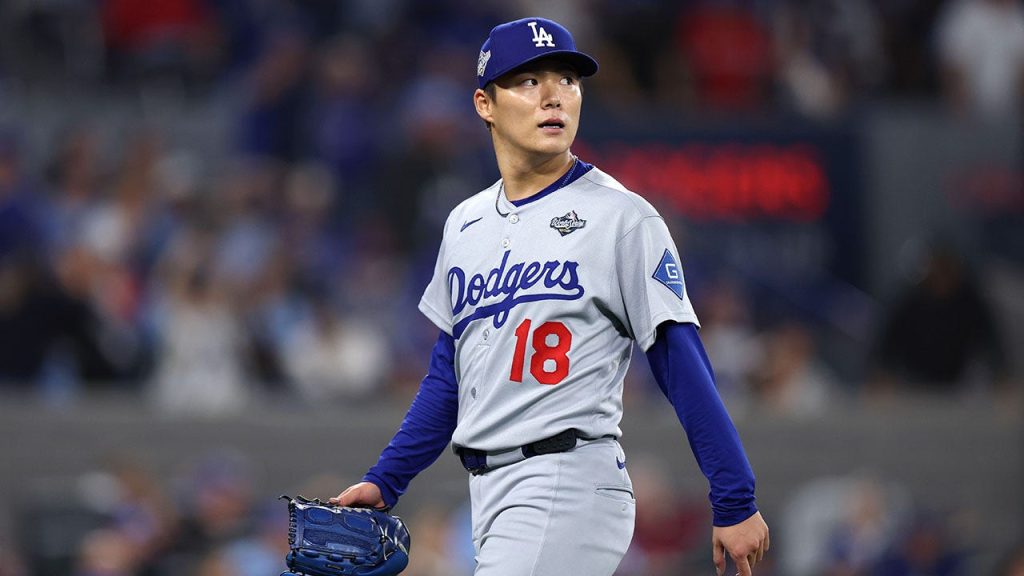Yamamoto Shines in Dominant World Series Performance
In a remarkable display of pitching excellence, Yoshinobu Yamamoto delivered a masterclass performance in Game 2 of the World Series, powering the Los Angeles Dodgers to a crucial 5-1 victory over the Toronto Blue Jays. The win evened the Fall Classic at one game apiece, shifting momentum as the series heads to Dodger Stadium. Yamamoto’s complete game brilliance featured just four hits and one earned run while striking out eight Blue Jays batters, prompting Dodgers manager Dave Roberts to describe his star pitcher’s performance as “outstanding, uber competitive, special.” The Japanese sensation’s poise under pressure was evident throughout the night as he methodically dismantled Toronto’s lineup, earning his place in baseball history in the process.
What makes Yamamoto’s achievement particularly noteworthy is its historical significance—he became the first pitcher since Curt Schilling in 2001 to throw consecutive complete games in the postseason. Schilling accomplished this remarkable feat three consecutive times during the Arizona Diamondbacks’ championship run, dominating in Games 1 and 5 of the NLDS and Game 3 of the NLCS. Putting Yamamoto’s accomplishment in further perspective, the last postseason complete game before his Sunday masterpiece was thrown by Justin Verlander with the Houston Astros during their controversial 2017 World Series championship season. In an era where complete games have become increasingly rare, especially in high-pressure playoff situations, Yamamoto’s back-to-back complete games stand as a testament to his extraordinary talent, endurance, and mental fortitude.
Yamamoto’s night wasn’t without early challenges, as he faced immediate trouble with the Blue Jays placing runners on first and third with no outs in the first inning. George Springer and Nathan Lukes threatened to give Toronto an early advantage, but Yamamoto showcased remarkable composure in navigating out of the jam. The Blue Jays also managed to get their leadoff hitter on base in each of the first three innings, yet Yamamoto remained unfazed. His only concession was a sacrifice fly to Alejandro Kirk, an insignificant blemish on an otherwise flawless performance. His arsenal was firing on all cylinders—the fastball-splitter combination that has become his signature was complemented by a deceptive 74 mph curveball that consistently fooled Toronto hitters throughout the evening. The precision and variety of his pitches kept the Blue Jays’ offense off-balance and largely ineffective against his dominance.
The pitching duel between Yamamoto and Toronto’s Kevin Gausman held strong until the seventh inning when the Dodgers’ offense finally broke through. Will Smith and Max Muncy delivered consecutive home runs, giving Los Angeles a 3-1 lead and shifting the game’s momentum decisively in their favor. The Dodgers would add two more insurance runs, building a comfortable cushion for their ace to work with in the final innings. However, such was Yamamoto’s command and dominance that these additional runs proved unnecessary—he appeared completely locked in and determined to finish what he started. Blue Jays manager John Schneider acknowledged the exceptional performance, noting, “He was just that good. He made it hard for us to make him work. He was in the zone, split was in and out of the zone. It was a really good performance by him.” This admission from the opposing dugout speaks volumes about the level at which Yamamoto was operating.
The significance of Yamamoto’s performance extends beyond the box score, representing a pivotal turning point in this World Series. After dropping the opening game, Los Angeles faced the daunting prospect of heading home in an 0-2 hole—a deficit that historically has been difficult to overcome in championship play. Instead, Yamamoto’s brilliance allowed the Dodgers to reset the series and reclaim home-field advantage as the action shifts to Dodger Stadium. His ability to provide nine complete innings also gave the bullpen a full rest day, a luxury rarely afforded in modern postseason baseball, potentially paying dividends as the series progresses. For a Dodgers team loaded with star power including Shohei Ohtani, Mookie Betts, and Freddie Freeman, it was their pitching ace who stepped forward when the team most needed a hero.
As the World Series now moves to Los Angeles for Game 3, the momentum has clearly shifted in the Dodgers’ favor, largely due to Yamamoto’s historic effort. The teams will resume battle Monday night in what promises to be an electric atmosphere at Chavez Ravine. Yamamoto’s performance has not only etched his name in postseason lore but has reinforced why the Dodgers made such a substantial investment in his talents during the offseason. For baseball purists, his complete game masterpiece represents a throwback to an earlier era when starters were expected to finish what they started. In an age of specialized bullpens and carefully managed pitch counts, Yamamoto’s display of traditional pitching excellence stands as a reminder of the timeless beauty of a dominant starting pitching performance on baseball’s biggest stage.


